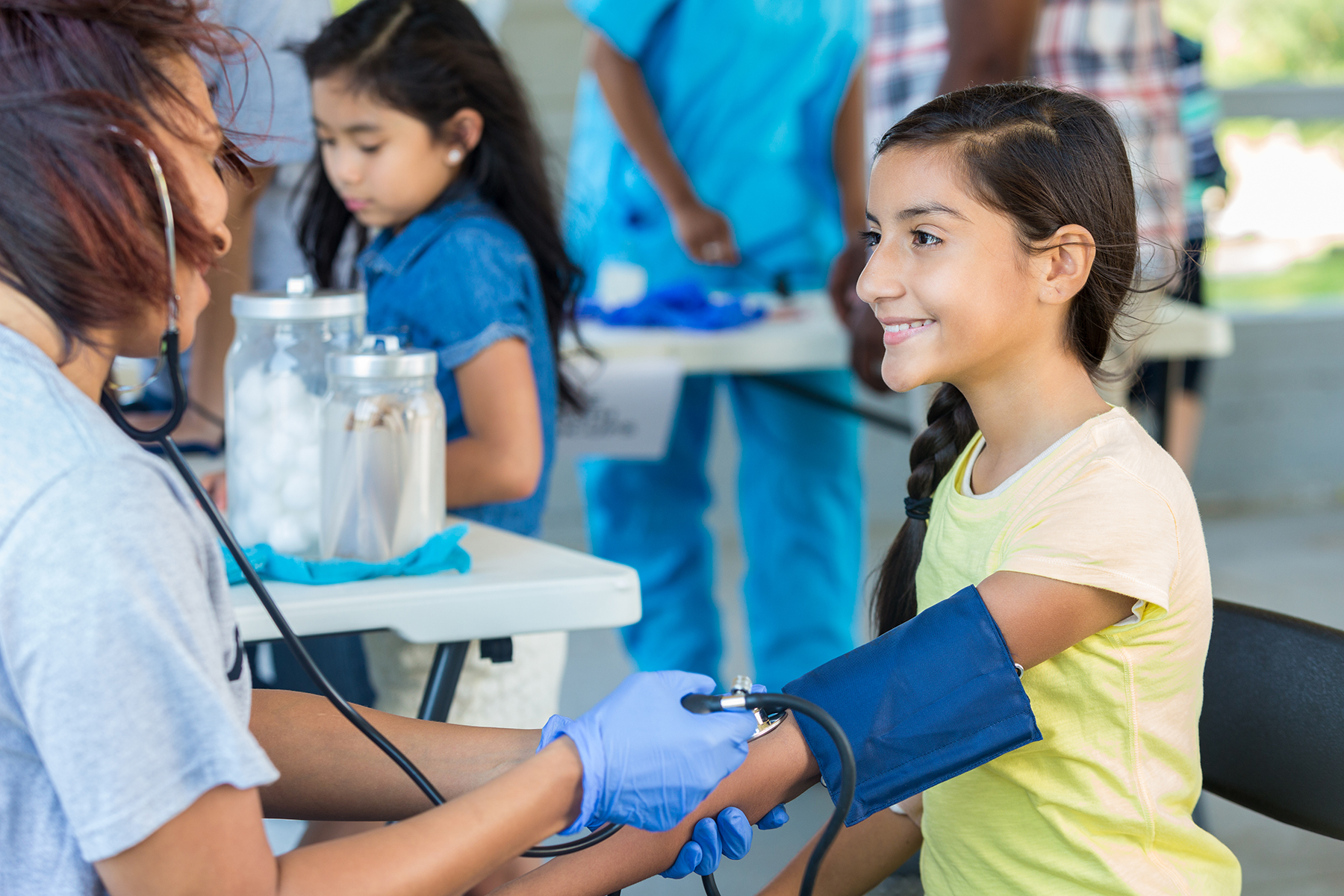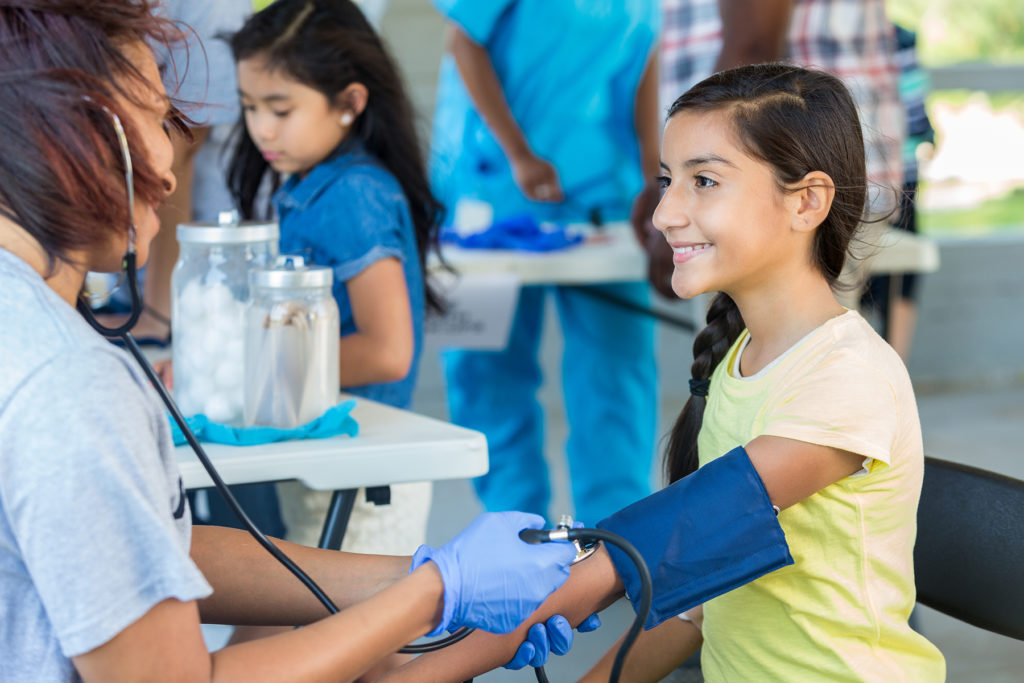Can Children Have High Blood Pressure?

It’s a disease most of us associate with older adults. But experts recommend that screening kids for hypertension to prevent future health problems.
Blood pressure has a genetic component – if one parent or grandparent has hypertension, the next generation has a higher risk for the disease. It’s important to screen children early to reduce the potential for vascular and organ damage.
Maria Carolina Delgado-Lelievre, M.D., is a founding director of the Comprehensive Hypertension Center at the University of Miami Health System. She is a former researcher for the Family Blood Pressure Program, a National Heart, Lung, and Blood Institute genetic study of hypertension. Her research has appeared in books and peer-reviewed publications.
“The CDC says one out of 25 children age 12 to 19 are hypertensive; nearly 100% of them have hypertensive parents or grandparents. Without blood pressure screening, nearly one in 10 of those kids will have elevated blood pressure within five years as the disease progresses,” she says.
Why are so many children with high blood pressure going undiagnosed?
“The concept of hypertension has evolved. Ten years ago, most people didn’t know they were hypertensive until they came to the ER with a heart attack or stroke. It’s a silent, systemic disease that affects the way our arteries respond. The threshold used to detect hypertension is lower now because of new American Heart Association guidelines,” says Dr. Delgado-Lelievre.

The guidelines define elevated blood pressure as 120/80 and above. The first number, systolic blood pressure, indicates when the heart is pumping blood. The second number, diastolic blood pressure, indicates when the heart relaxes so it can fill with blood again.
Another reason? Many doctors don’t look for high blood pressure in otherwise healthy kids and teens. “Hypertension is not being caught by pediatricians. Doctors will say a 17-year-old with a blood pressure of 140/90 is just nervous or stressed. Hypertension is the most common cardiovascular disease found in high school and college athletes.”
Understanding the risk factors
You couldn’t blame a teenager for reacting with, “Life isn’t fair!” when Dr. Delgado-Lelievre says they need blood pressure medication. Unfortunately, even if their blood pressure is around 120/70, if their parent is hypertensive, they will probably follow suit. A child with normal blood pressure whose parent had a heart attack is also at higher risk.
Effective treatment is a family affair.
When a patient comes to her for the first time, Dr. Delgado-Lelievre tells them, “You are here for me to understand who you are.” She creates a comprehensive patient profile using four “pillars” developed through her research and clinical practice:
- Genetic. Evaluating a family medical history reveals whether parents, grandparents, or other relatives are hypertensive. “Whatever you are, you pass on to your kids. The risks add up to an early expression of hypertension in young people.”
- Biochemical. Since no two hypertensive people are alike, Dr. Delgado-Lelievre analyzes the body chemistry of each patient. “In every genetic makeup, there is a culprit, a mechanism you can treat to regulate blood pressure. We target the culprit pharmacologically and with diet.”
- Physiological. “Blood pressure has its own circadian rhythm (sleep/wake cycle). There’s a normal variability. We evaluate blood pressure changes during the day and night.”
- Environmental. Stress, exercise, rest, diet, and habits all affect blood pressure. “The family environment or lifestyle gets imprinted on children.”
Together, the four pillars create a hypertension profile unique to each patient. “When you establish that profile, you can establish a risk profile that allows you to prevent damage,” says Dr. Delgado-Lelievre. She treats the parent first; once they understand the genetic component of their disease, she recommends screening their children and determining whether they are hypertensive now or at risk in the future.
Why is hypertension more common than we once believed?
Dr. Delgado-Lelievre says genetics are primarily responsible. “Hypertension is an evolutionary mistake in response to our environment. When life on earth transitioned from water to land, it needed something to control blood volume on dry land. The hormone aldosterone, which has a huge effect on regulating water, salt, and potassium, first appeared millions of years ago in the lungfish, a fish with lungs. As such, this was a first transition linking water to terrestrial life. The way we respond to the environment, especially the management of blood volume, is part of our genetic makeup. In many hypertensive patients, aldosterone plays an important role in environmental adaptation and blood pressure regulation.”
For example, after evaluating one patient’s bloodwork and urinalysis, she identified aldosterone as the culprit and prescribed appropriate medication. “He went from taking six medications to one. His wife told everyone I cured her husband, but you don’t cure hypertension; you target the culprit.”
Salt sensitivity is another genetic aspect of hypertension that results from evolution adaptation, again, adapting to volume and sodium regulation. Dr. Delgado-Lelievre says that when humans began migrating around the globe, they used salt to preserve food. That led to a significant genetic adaption. She cites a remote Amazon Indian tribe that scientists discovered had no salt in their diet. “They all have normal blood pressure because they never ate any sodium.”
In contrast, more than 90% of school-age children eat more salt than is recommended.
Tame the triggers of high blood pressure
We can’t change our genes, but we can control the triggers that damage or protect cardiovascular health. It begins at the cellular level, with endothelial cells lining our blood vessels. When these cells are healthy, they do a good job regulating the flow of nutrients in and out of our tissues. When the endothelium layer becomes damaged by certain environmental triggers, our arteries stiffen and may become clogged with cholesterol. “Kids with normal blood pressure can have early signs of endothelial dysfunction,” Dr. Delgado-Lelievre says.
To protect your blood vessels from damage, avoid:
- Substance abuse
- Tobacco products
- Energy or protein drinks with added stimulants
- Caffeine
- A sedentary lifestyle
- Unhealthy foods
To promote healthy endothelium, practice these lifestyle habits:
- Eat nutritious foods
- Exercise
- Spend time outdoors
- Maintain a healthy weight
- Manage stress
Managing hypertension in kids
Depending on the diagnosis, some children with high blood pressure may require medication, but all benefit from a healthy lifestyle. “In stage one hypertension (blood pressure of 130-139), environmental intervention is the most effective way to lower blood pressure without medication.”
Here are some key takeaways for parents of children with high blood pressure:
- If you have a family history of hypertension and/or heart disease, get your child’s blood pressure evaluated – the Center does 24-hour blood pressure monitoring on patients.
- Replace foods high in fat, salt, sugar, and calories with more fruits, vegetables, and whole grains.
- Encourage kids to drink more water.
- Make sure your kids get daily physical activity.
- Use the CDC’s Child and Teen BMI calculator to determine a healthy weight.
- Be a good role model – practice healthy habits yourself.
How do we help children with high blood pressure?
Rather than treating the end results of hypertension, Dr. Delgado-Lelievre believes that early identification and intervention, even in children as young as 12, is the key to turning the tide on America’s number one killer.
“Hypertension is the big umbrella of heart disease. I tell patients, ‘The disease doesn’t stop with you, your parents, or your grandparents. It is transmitted to your children.’” By increasing our awareness of this disease and its genetic connection, she hopes to change the health of generations to come.
To learn more about the Comprehensive Hypertension Center, call 305-243-1960. To make an appointment, call 305-243-5554 and ask for Kelly Quintana.
Nancy Moreland is a regular contributor to UMiami Health News. She has written for several major health care systems and the Centers for Disease Control and Prevention. Her writing also appears in the Chicago Tribune and U.S. News & World Report.
Tags: Comprehensive Hypertension Center, Dr. Maria Delgado-Lelievre, high blood pressure, hypertension
